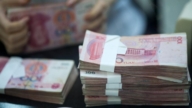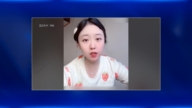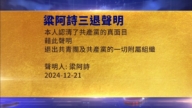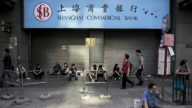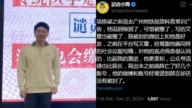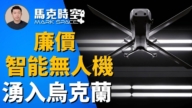【新唐人2014年02月28日讯】3月1号,提出辞职的美国驻华大使骆家辉将离开北京,26号他发表了告别演说。对于这位从一到任就引发国人和官媒高度关注的“史上首位华裔美国驻华大使”,在他任期期间发生了两件震惊国际的大事,包括前重庆市公安局长王立军,和山东盲人维权人士陈光诚,先后逃进美国驻华使领馆中,寻求政治庇护,骆家辉的处理是否恰当?请看本台记者唐音的报导。
骆家辉是移民美国的华人家庭第三代,他在向中国大学生所作的告别演说中表示,“中国拥有十分美好的前景”。同时他也明确提出﹕大陆领导人不应“为了短期的社会稳定而牺牲对公民参与的长期回馈”。
骆家辉是在2011年7月27号出任美国驻华大使,这期间,中国发生了两件震惊国际社会的大事。
一件是2012年2月6号,中共前重庆市公安局长王立军逃入美国驻成都领事馆﹔两个多月后,山东盲人维权人士陈光诚,为躲避山东临沂政府对他长期的软禁监控,也逃进了北京的美国驻华大使馆。
中国资深记者、专栏作家高瑜:“这两件事我认为他处理得都非常好。当然他要受到美国国务院的一些制约,如果让他个人处理,我认为,他会处理得还有更精彩之处。他自己个人也做出了很的努力,比如说他亲自接陈光诚进美国大使馆,这都是很了不起的。”
经美国媒体透露:王立军在美国领事馆中,曝光了中共前重庆市委书记薄熙来和中共前政治局常委,政法委书记周永康密谋政变等内幕。
前中共驻悉尼总领事馆政治领事陈用林:“他处理这两件事是非常恰当的。王立军在国内坏事干尽,臭名昭著,所以在内斗的时候希望保命,跑到大使馆去的,美国人真的要是给王立军保护起来,那本身就是个错误。”
而陈光诚因揭露当地官员在执行计划生育政策时,侵犯人权,甚至草菅人命,因而遭到中共政法委和地方当局的长期迫害,甚至被剥夺生存的条件。
陈用林:“陈光诚寻求美国的保护,一方面是要自己的家庭能够得到人道主义保护,同时完全是一个中国最弱势的一个代表。保护了他,也就是保护了中国的良心,实际上是从保护陈光诚开始,很明确的表明了美国对中国的大的人权政策。”
除了这两件大事以外,骆家辉在中国的一举一动都受到民间和官方的高度关注。从他搭飞机坐经济舱、住酒店选便宜房,在美国使馆监测北京空气污染指数并对外公布,还去农民工子弟的学校和西藏等地了解人权情况等。中共媒体一直公开对他进行批评,民间则认为他给中国的思想带来了冲击和启发。
前中共驻悉尼总领事馆政治领事陈用林:“骆家辉我认为他是真正的很出色的华人大使。他是以中国人的血统为自豪,但是他并不以中共的专制统治和独裁洗脑这种制度而自豪,觉的这个是耻辱。他更多的希望推动中国走向民主、自由、进步和更有人权的社会。”
骆家辉在告别演说中强调:“要让这个国家的潜力得到充分发挥,要依靠一个独立的司法体制、一批有献身精神的律师、明智的领导人,但最重要的是对法治的尊重。”
高瑜:“我认为他是一个非常棒的、而且向中国坚持美国的立场、向中国传播了普世价值、和美国的民主自由的那种理念的,一个非常了不起的大使。”
骆家辉将于2月底正式卸任,3月1号离开北京。美国资深参议员麦克斯•鲍克斯已经被任命为下一任驻华大使。
采访编辑/唐音 后制/钟元
High Praise for Ambassador Gary Locke, From the Chinese People
U.S. Ambassador to China Gary Locke who has resigned
will leave Beijing on March 1, 2014.
On February 26, he delivered a farewell speech.
As “the first Chinese American Ambassador to China",
Gary Locke attracted a great amount of attention from
Chinese people and official media since he took office.
During his tenure two shocking events happened
with international implications:
former Chongqing police chief Wang Lijun and
Handong blind activist Chen Guangcheng fleeing into the
U.S. Embassy seeking political asylum.
Did Locke handle these events well?
Locke is third generation of Chinese immigrant.
During his farewell speech to Chinese college students
he said “China has a great future ahead of it."
He also clearly stated: China’s leaders should not sacrifice
“the long-term rewards of citizen engagement for a short
term definition of social stability."
Gary Locke was appointed U.S. Ambassador to China
on July 27, 2011.
During his tenure two events occurred in China that
shocked the international community.
One event was former Chongqing Public Security Bureau leader
Wang Lijun fleeing to the U.S. Consulate in Chengdu
on February 6, 2012.
More than two months later blind activist Chen Guangcheng
also fled to the U.S. Embassy in Beijing
to escape from long-term house arrest and monitoring by
the Linyi government.
Chinese senior reporter and columnist Gao Yu:
“I think he handled both events very well.He was subject
to some constraints from the U.S. Government.
If he was allowed to handle it independently, I think he
would have done it more efficiently.
He also made great efforts,such as personally getting
Chen Guangcheng into the U.S. embassy.
This is fantastic."
U.S. media revealed that Wang Lijun exposed the insider plotting
of a coup by former Party Secretary of Chongqing City Bo Xilai,
and former Secretary of Politics and Law Committee
Zhou Yongkang.
Former political consul of Chinese Consulate General
in Sydney, Chen Yonglin:
“He handled two things appropriately.Wang Lijun did
excessive bad deeds. He is notorious.
He went to the U.S. embassy to get a chance to live
as a result of internal struggles.
If the U.S. protected Wang Lijun, it would be a mistake."
Chen Guangcheng endured long-term persecution,
and was even deprived of basic living conditions
by the Chinese Communist Party (CCP), the Political and
Law Committee and local authorities,
for exposing local officials’ crime of human rights violations,
and even disregarding human life in the implementation
of the family planning policy.
Chen Yonglin: “Chen Guangcheng sought asylum
to get humanitarian protection for his family.
This is also a representation of the most vulnerable groups.
Protecting him is to protect China’s conscience.
In fact by protecting Chen, the U.S. clearly showed
its human rights policy to China."
Locke’ every move in China were the subject of people’s
and official’s attention,
such as him flying economy class,staying in cheaper rate hotels,
monitoring and publishing Beijing’s air pollution index at the U.S.
Embassy
and understanding the human rights situation by visiting
schools of migrant workers, and Tibet.
The CCP media has been openly criticizing him. Chinese people
think Locke impacted and inspired Chinese people’s thinking.
Chen Yonglin: “Locke is really an outstanding Ambassador
of Chinese descent.
He is proud of being a Chinese American, but he was not
proud of the CCP’s dictatorship and authoritarian regime.
He feels it is a disgrace. He hopes to promote China into a country
of more democracy, freedom, human rights and progress."
In his farewell speech, Locke stressed: “But reaching its full
potential will depend on a neutral and respected judiciary,
an active set of dedicated lawyers, wise leadership, but most
of all, reverence toward the rule of law."
Gao Yu: “I think he is a great Ambassador, emphasizing the U.S.
position to China,
spreading universal values and the U.S. concept of democracy
and freedom to China. A great Ambassador."
Locke will officially leave his position at the end of February.
He will leave Beijing on March 1, 2014.
Senior U.S. Senator Max Baucus has been appointed
as the next Ambassador to China.
Interview & Edit/Tang Yin Post-Production/Zhong Yuan



